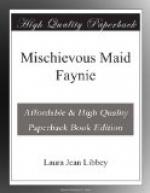“The will was drawn two years ago; I am confident that it is the latest—that there is no other. I took a desperate chance to do what I have done to-night—so cleverly that it could never be detected.
“A few strokes of the pen meant wealth or poverty for us, Claire. I am too old to face beggary after living a life of luxury. You will not betray me, Claire—you dare not, knowing that it was done for your sake, Claire.”
The girl was not naturally wicked; she had always had a great respect for the high-bred, beautiful Faynie—her stepfather’s daughter by his first wife. There had been no discord between the two young girls.
Still, as her mother had said so emphatically, it was better that Faynie should step out of that lovely home a beggar than that they should lose it.
Claire quite agreed with her mother that Faynie must stay there for the present at all hazards; it would arouse such an uproar if she were thrust from that roof just then.
“If my father has expressed the desire that I shall stay here six months, I—I shall do so, even though it breaks my heart,” Faynie had said.
She kept her own apartments, refusing to come down to her meals, and Mrs. Fairfax humored this whim by ordering Faynie’s meals served in her rooms.
In vain the old housekeeper expostulated with Faynie, urging her to come down at least to the drawing-room evenings, as she used to do.
Faynie shook her golden curls.
“It is no longer my home,” she would say, with bitter sobs; “I am only biding my time here—the six months that I am in duty bound to remain—then I am going away—it does not matter where.”
The old housekeeper had tried in vain to coax from the girl the story of where she had been while away from home.
“That is my secret,” Faynie would say, with a burst of bitter tears; “I shall never divulge it—until the hour I lie dying.”
CHAPTER XVII.
Every man to his Trade.
After the bogus Lester Armstrong had dispatched his letter of acceptance to Mrs. Fairfax he braced himself for what would happen next by taking a deep draught from the silver brandy flask which he kept in his breast pocket, though he realized that he had need of all his senses for any emergency.
During the next hour a score or more bookkeepers came to him with bills, letters and papers of all descriptions. To one and all he said, with a yawn, and very impatiently: “Leave what you have brought on my desk; I’ll look over it this afternoon.”
Then it occurred to him that such a great concern must have a general manager, and of course he would know something about the different papers these people had brought for his inspection and for him to pass upon, which were like so much Greek to him.
In answer to his summons, a tall, dignified, keen-eyed elderly man responded—a man who struck considerable awe to Kendale’s guilty heart. He said to himself that he wished to the Lord he knew this man’s name to be able to call him by it—but of course it couldn’t be helped.




